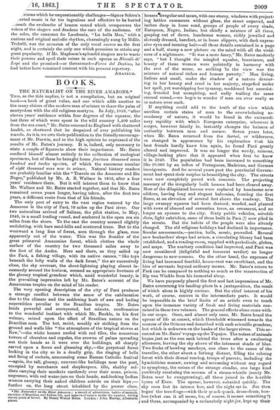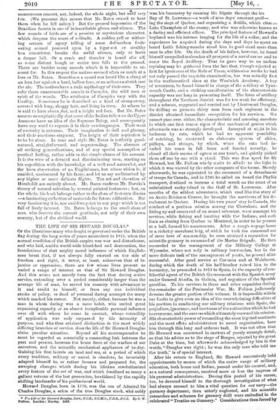BOOKS.
THE NATURALIST ON THE RIVER AMAZONS.* THIS, as the title implies, is not a compilation, but an original book—a book of great value, and one which adds another to the many claims of the modern man of science to share the palm of martyrdom with the old religious martyrs. In July, 1859, "after eleven years' residence within four degrees of the equator, the last three of which were spent in the wild country 1,400 miles from the sea coast," Mr. Bates returned to England with shattered health, so shattered that he despaired of ever publishing his travels. As it is, we owe their publication to the friendly encourage- ment of Mr. Darwin, and to the high opinion he expressed of the results of Mr. Bates's journey. It is, indeed, only necessary to state a couple of figures to show their importance. Mr. Bates confined himself almost entirely to the collection of zoological _specimens, but of these he brought home fourteen thousand seven hundred and twelve species, of which the enormous number of eight thousand were new to science. Natural history readers are probably familiar with the "Travels on the Amazons and Rio Negro," published by Mr. A. R. Wallace in 1852, after a four years' residence there. But it will interest them to know that Mr. Wallace and Mr. Bates started together, and that Mr. Bates remained seven years longer, having taken, after the first two years, a different route from that of his friends.
The only port of entry to the vast region watered by the Amazons is the city of Para, 70 miles up the Pant river. Our two naturalists arrived off Salinas, the pilot station, in May, 1848, in a small trading vessel, and anchored in the open sea six miles from the shore. To the east the country seemed slightly undulating, with bare sand-hills and scattered trees. But to the westward a long line of forest, seen through the glass, rose apparently out of the water. This was the frontier of the great primmval Amazonian forest, which clothes the whole surface of the country for two thousand miles away to the foot of the Andes. Here and there, as they sailed up the Para, a fishing village, with its native canoes, "like toys beneath the lofty walls of the dark forest," the air excessively close, the sky overcast, the sheet-lightning playing almost in- cessantly around the horizon, seemed an appropriate foretaste of the gloomy tropical grandeur which, amid wonderful beauty, is the prevailing impression left by Mr. Bates's account of the Amazonian tropics on the mind of his reader.
The very opening description of the city of Para' produces a strange conflict between the sense of the exhilaration due to the climate and the saddening hush of awe and boding superstition peculiar to the Brazilian tropics. Mr. Bates lends powerful and unexpected, but minute, confirmation to the wonderful instinct with which Mr. Buckle, in his first volume, seized upon the effect of Brazilian nature on the Brazilian man. The hot, moist, mouldy air striking from the ground and walls like "the atmosphere of the tropical stoves at Kew,"—the white houses roofed with red tiles, the numerous towers of churches and cupolas, the crowns of palms spreading out their hands as it were over the buildings, all sharply carved upon a fierce and gleaming sky,—the perpetual forest locking in the city as in a deadly grip, the ringing of bells and firing of rockets, announcing some Roman Catholic festival —again, the tall, gloomy, convent-like buildings near the port, occupied by merchants and shopkeepers, idle, shabby sol- diers carrying their muskets carelessly over their arms, priests, negresses, with red water-jars on their heads, sad-looking Indian women carrying their naked children astride on their hips ;- further on, the long street inhabited by the poorer class, • The Naturaiilt on the River Amazons ; a record of adventures, habits of animals, sketches of Brazilian and Indian life. and aspects of nature under the equator, during eleven years of travel By Henry Walter Bates. London ; John Murray, Albemarle street.
housesIrregular and mean, with one storey, windows with project- ing lattice casements without glass, the street unpaved, and inches deep in loose sand, groups of people of every shade, European, Negro, Indian, but chiefly a mixture of all three, gasping out of doors, handsome women, richly jewelled and slovenly dressed, barefoot, or in loose slippers, with dark expres- sive eyes and teeming hair—all these details contained in a page and a half, stamp a new picture on the mind with all the vivid- ness of a nightmare. "It was a mere fancy," Mr. Bates modestly says, "but I thought the mingled squalor, luxuriance, and beauty of these women were pointedly in harmony with the rest of the scene, so striking In the view was the mixture of natural riches and human poverty." Man living, listless and small, under the shadow of a nature devour- ing in her beauty and cruel in her majesty, stupefied under her spell, yet worshipping her tyranny, maddened but unresist- ing, frenzied but unaspiring, and sadly trailing the same eternal round,—we begin to wonder if men are ever really so or nature ever such.
If anything could add to the truth of the view which ascribes certain states of man to the overwhelming as- cendancy of nature, it would be found in the extraordi- nary rapidity with which European enterprise, wherever it surges, however faintly in, instantly changes the balance of authority between man and nature. Seven years later, when Mr. Bates returned from the Sertao, or wilderness, so changed in appearance by his exploration that his best friends hardly knew him again, he found Para greatly altered and improved. It was no longer the weedy, ruinous, village-looking place that it appeared when first he knew it in 1848. The population had been increased to something like 20,000 by an influx of Portuguese, Madeiran, and German immigrants. And for several years past the provincial Govern- ment had spent their surplus in beautifying the city. The streets were now completely paved with concrete. The projecting masonry of the irregularly built houses had been cleared away. Most of the dilapidated houses were replaced by handsome new edifices, having long and elegant balconies, fronting the first floors, at an elevation of several feet above the roadway. The large swampy squares had been drained, weeded, and planted with rows of almond and casuarina trees, an ornament, and no longer an eyesore to the city. Sixty public vehicles, mirabile dictu, light cabriolets, some of them built in Pala (!) now plied in the streets. But the habits of the people were also already changed. The old religious holidays had declined in importance. Secular amusements,—parties, balls, music, prevailed. Several new booksellers' shops had arisen, a circulating library had been established, and a reading-room, supplied with periodicals, globes, and maps. The sanitary condition had improved, and Pant was now considered (delightful and innocent verdict) no longer dangerous to new-comers. On the other hand, the expenses of living had increased fourfold, house-rent was exorbitant, and the hire of servants beyond ordinary means. Mr. Bates's return to Para can be compared to nothing so much as the resurrection of Rip van Winkle from his immortal sleep.
We have purposely placed the first and last impressions of Mr. Bates concerning his lauding. place in a juxtaposition, the result of which alone is highly curious. But the chief interest of his work, of course, centres in the intermediate parts. It would be impossible in the brief limits of an article even to touch upon the immense variety of fresh and living materials con- tained in these two volumes. The general effects alone come with- in our scope. Once, and almost only once, Mr. Bates heard the uproar of life at sunset, which Humboldt witnessed towards the sources of the Orinoco and described with such scientific grandeur, but which is unknown on the banks of the larger rivers. This oc- curred on Mr. Bates' voyage up the Tapajos. The noises of animals began just as the sun sank behind the trees after a sweltering afternoon, leaving the sky above of the intensest shade of blue. Two flocks of howling monkeys, one close to the canoe of the traveller, the other about a furlong distant, filling the echoing forest with their dismal roaring, troops of parrots, including the hyacinthine macaw, cawing and screaming without any regard to symphony, the noises of the strange cicadas, one large kind positively emulating the scream of a steam-whistle (surely Mr. Bates must be exaggerating), all these joined in the horrible hymn of Even. The uproar, however, subsided quickly. The sky EOM lost its intense hue, and the night set in. But then began the tree-frogs—with their qtack-quack, drum-drum, boo- hoo (what can it all mean, for, of course, it means something ?) and these, accompanied by a melancholy night-jar, kept up their
monotonous concert, not, indeed, the whole night, but mall very tote. (We presume this means that Mr. Bates ceased to hear them when he fell asleep.) But the general impression of the Brazilian forests is one of indescribable gloom and silence. The few sounds of birds are of a pensive or mysterious character, which deepens the sense of solitude. A sudden yell or wither- ing scream of agony telling of some defenceless fruit- eating animal pounced upon by a tigar-cat or stealthy boa constrictor, breaks the awful silence, only to leave a deeper lull. Or a crash and thunder is heard afar off, as some distant bough or entire tree falls to the ground. There are besides many sounds which it is impossible to ac- count for. In this respect the natives seemed often as much at a loss as Mr. Bates. Sometimes a sound was beard like a clang of an iron bar against a bar], hollow tree, or an unknown shriek rent the air. The natives have a rude mythology of their own. They refer these unaccountable sounds to Curupfra, the wild man or spirit of the woods. The attributes of Curupfra vary with the locality. Sometimes lie is described as a kind of orang-otang, covered with long, shaggy hair, and living in trees. At others he is said to have cloven feet, and a bright red face. But Mr. Bates assures us emphatically that none of the Indian tribes on theUpper Amazons have an idea of the Supreme Being, and consequently have any word to express it in their own languages. Their want of curiosity is extreme. Their imagination is dull and gloomy, and their emotions stagnant. The height of their aspiration is to be let alone. In tone and style Mr. Bates is perfectly good- natured, straightforward, and unpretending. The absence of all striking generalizations, and of any special assumption of poetical feeling, rather adds to the simple charm of his account It is the view of a devoted and discriminating man, starting on his expedition with the knowledge of a well read naturalist, and the keen observation of an Englishman, but whose vision is, if unaided, unobscured by his fancy, and let us say undisturbed by any higher or more delicate flights. The art and elevation of Humboldt are entirely absent. Mr. Bates confirms Mr. Darwin's theory of natural selection by several pointed instances ; bat, on the whole, his book belongs rather to the class of first-rate diaries —a fascinating collection of materials for future edification. But very fascinating it is, nor could we point to any page which is not full of lively interest. Mr. Bates belongs to the small class of men who deserve the earnest gratitude, not only of their own country, but of the civilized world.































 Previous page
Previous page